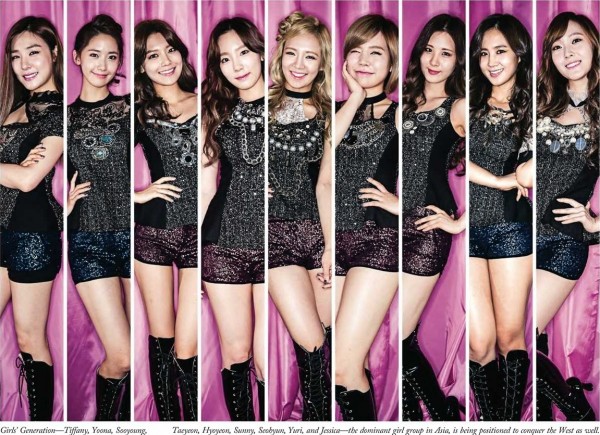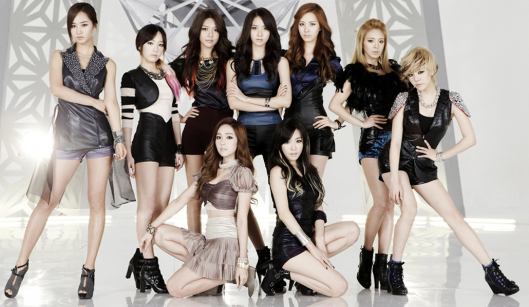
I’m going to go out on a limb and say that unless you’ve been living under a rock, you probably know about PSY’s “Gangnam Style”. I’m also going to take a wild guess and assume that, by reading this on Soshified, you’re probably a Girls’ Generation fan. Within the past year, SONEs celebrated the girls’ debut in the United States and swelled with pride after their appearances on “Late Show with David Letterman” and “Live! With Kelly”, but the progress into the Western market has not advanced since those landmark events nearly eight months ago.
At the time, we viewed Girls’ Generation’s appearances on American television as a huge step forward in K-Pop’s seemingly inevitable advancement into Western markets. They remain historic, but they seem like tiny droplets in an ocean compared to the tidal wave of explosive popularity that PSY has experienced with “Gangnam Style”. At this rate, one would think that the sky is falling for Girls’ Generation’s chances of long-term success in the West, right? Despite the fact that PSY’s music doesn’t exactly fall into the traditional K-Pop musical mold of catchy repetitive hooks and stunning good looks, he managed to captivate America and the entire world in a matter of weeks. The recent“New Yorker” article featuring Girls’ Generation even suggested that PSY “may have subverted K-pop’s chances of making it big in the West.”
With all of these things in mind, I still think that Girls’ Generation’s chances of success in the Western market are as good as they have ever been and that they could even be better after the unexpected popularity of “Gangnam Style”. I’ve heard most of the opinions arguing that “Gangnam Style” is bad for K-Pop’s popularity in the West, and I know that many people are uneasy about its success. I’ve heard the concerns about Westerners only caring about the silly dance or that the stereotypical portrayal of Asians is bad for K-Pop. The counter-argument I have in mind for those concerns is that I see the “Gangnam Style” phenomenon as an opportunity to insert Korea and its culture into the general consciousness of the Western population.

For a large number of people in the West, Korea is still somewhat of a mystery. The history of the Korean War and the division of the North and the South are well-known, and the popularity of Korean electronics and cars has been on the rise. Despite that, Korean culture and entertainment are, to a significant degree, an unknown entity to the rest of the world. Most Westerners don’t even know that something such as K-Pop or Girls’ Generation exists. We take it for granted because, as SONEs and K-Pop fans, we are exposed to Korean culture and entertainment on a regular basis, so we are aware of what Korea has to offer. Now, the general population in the West also knows about a small piece of Korea’s rich culture, but there is so much room for expansion.
PSY has made it a point to let people know that he is from Korea, even going so far as to say “대한민국만세” (loosely translated as “Korea rules”) live on the “Today” show. K-Pop fans may think that the image of Korea and K-Pop being portrayed by “Gangnam Style” is misguided, but among Western audiences that image is overwhelmingly positive at the moment. PSY is a well-educated and independent-minded artist whom I believe can be a good ambassador for Korea and its culture. It’s easier for him to connect to American audiences because he attended an American university for four years, he can speak relatively fluent English, and he has an easygoing personality. These types of useful traits also apply to Girls’ Generation’s English-speaking members. If PSY is able to help build the image of Korea in a positive manner within the minds of people in the West, I only see it as a beneficial situation for Girls’ Generation. They will be able to make similar connections with English-speaking audiences because of Jessica, Tiffany, and the other members who have surely been practicing their English skills.
Think of the cultural-awakening experiences that many of us have had as Girls’ Generation fans. Many of us started out by watching a few Girls’ Generation music videos and/or SoShi Subs videos, and then from there, everything began to snowball. Soon enough, we fell in love with everything Korean. We ended up wanting to try more Korean food. We started to learn more about Korean culture. Some of us even started on the difficult path of trying to learn the Korean language. Many of us developed a beautiful image of Korea, Korean products, and Korean culture in our minds because of Girls’ Generation. Some of us even took an adventurous leap by travelling around the world to visit Korea. I think the potential is there for this same effect to take place in the West, but in reverse: as Korea’s reputation grows and becomes increasingly positive and popular, the effect of Girls’ Generation proudly proclaiming “We are from Korea” will begin to carry more weight and draw more attention. If Girls’ Generation’s oft-rumored English album eventually gets made and released and it turns out to be a rousing success, that will only reinforce the notion that Korea’s culture and entertainment deserve the attention and praise that we’ve been giving it for years.

I’m not without my concerns in all of this. I hope that Girls’ Generation doesn’t Americanize their own style to fit the Western audience, and I want them to be able to say, “Yes, we are a Korean pop girl group, and this is our distinctive style.” With new Japanese and Korean singles and albums around the corner, it’s unclear when the next step in their attempt to conquer the United States will occur. I, for one, hope that whenever Girls’ Generation takes that next step, they will benefit from the brighter spotlight on Korean culture and entertainment that I think PSY can create, and I’m confident that the girls themselves will also contribute to and benefit from Korea’s cultural expansion.
Disclaimer: Views expressed are solely those of the author and are not representative of the Soshified community as a whole.
Tidak ada komentar:
Posting Komentar